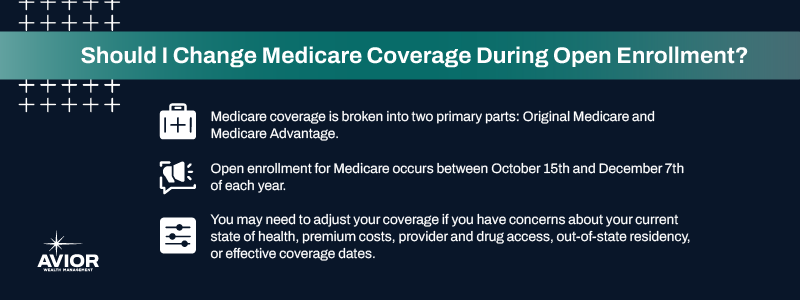Should I Change Medicare Coverage During Open Enrollment?
Annual open enrollment is an excellent time to assess your options and find the right fit.

Open enrollment season for Medicare coverage, the best time to make changes to your coverage as needed, begins on October 15th and ends on December 7th.
Medicare coverage presents plenty of options for those in need, but knowing exactly how and what to change about your policy can be difficult to pinpoint.
That’s why, in this article, we’ll explore how open enrollment for Medicare works and what you should account for when considering changes or joining a new plan.
Types of Medicare Coverage
The first step is understanding the different parts of Medicare and what they represent. Medicare coverage is broken up into two programs: Original Medicare and Medicare Advantage.
Original Medicare is the government-run health insurance program for people aged 65 and older.
It consists of two parts:
- Part A: Covers hospital services like inpatient stays, skilled nursing facility care, and hospice care.
- Part B: Covers doctor visits, outpatient surgery, and medical tests.
On the other hand, Medicare Advantage is a private health insurance plan that combines Part A and Part B. It’s offered by private insurance companies and can include additional benefits like prescription drug coverage (Part D), dental, vision, and hearing services.
Medicare Advantage is also known as Part C.
The benefit of Medicare Advantage is that out-of-pocket costs are usually lower than with Original Medicare. Some Part C offerings also include vision, dental, and hearing care options.
The downside is that you must use providers within the plan’s specific network.
Details About Medicare Open Enrollment
If you’re considering switching from Original Medicare to Medicare Advantage or making other alterations to your coverage, you’ll generally do so during annual open enrollment.
Open enrollment allows you to:
- Join, cancel, or change a Medicare Advantage plan;
- Add or cancel drug coverage;
- Change from Original Medicare to Medicare Advantage;
- Change from Medicare Advantage to Original Medicare; and
- Switch drug plans within Original Medicare.
There’s also the Medicare Advantage open enrollment period, which is specific to that coverage. If you already have this plan, your open enrollment period will be between January 1st and March 31st.
Changes you can make during the Medicare Advantage open enrollment period include:
- Changing to a different Medicare Advantage plan;
- Going from Medicare Advantage to Original Medicare; and
- Joining a separate drug plan.
If you’re new to Medicare completely and don’t have a policy yet, your open enrollment period is three months before getting coverage to three months after getting coverage.
During this time, you can join any plan. Note that, to opt for Medicare Advantage during this time, you need both Part A and Part B.
What to Know About Special Enrollment Periods
Special enrollment periods may come into effect during certain life events that allow you to update your Medicare coverage.
Examples of such life events include moving, losing coverage, becoming eligible for other coverage, or getting Medicaid.
In cases such as these, your special enrollment period will vary. If you sign up for Parts A and B within a special enrollment period, you have two months to change plans or join a plan.
Ultimately, the types of changes you can make to your coverage depend on the specific life event you’re enduring.
For example, if you move to an address outside of your plan’s coverage area, you can change to a new Medicare Advantage or drug plan during this special enrollment period.
If you become eligible for other coverage, you can drop your Medicare Advantage or drug plan during special enrollment to enroll in something else.
Factors to Consider When Assessing Your Coverage
Aside from life events that trigger special enrollment periods, you may experience other life changes that require adjustments to your current coverage.
Such life changes can include the following.
1. Changes to Your Healthcare Needs
Significant changes to your health, such as a new diagnosis, may drastically impact the type of Medicare coverage you need.
You may need a more robust plan to meet your needs. You also may want to add coverage for dental, hearing, or vision care, which can be found in Medicare Advantage plans.
2. Expensive Premiums and Deductibles
Of course, cost always plays a role in selecting the right health insurance policies.
Your premium may have increased, or your deductible may be too high. Open enrollment is the perfect time to analyze affordability and compare plans to find the right balance of savings and comprehensive coverage.
3. Provider and Drug Access
Medicare Advantage plans require that you stay within the plan’s network. If you have a provider you want to use who isn’t in your current plan, switching to Original Medicare may be the right call.
You may also want to add drug coverage if you need to start taking prescription medications.
4. Out-of-State Concerns
When you move to a new state, you don’t always have to worry about enrolling in new coverage.
You can usually still use the same coverage no matter your state since Medicare is a federal program.
However, some Medicare Advantage plans aren’t offered in every state. You also have different concerns in different states, such as provider choices.
During open enrollment, consider comparing costs and searching for providers you want to pursue. This may impact your choice to select Original Medicare or Medicare Advantage.
5. Effective Dates of Changes
Whatever Medicare policy decisions you make will go into effect on January 1st of the following year. However, if you’re making changes to a Medicare Advantage plan, these changes take effect on the first day of the month following the plan receiving your request.
Note that effective dates during special enrollment periods will vary but are usually the first day of the month that your plan receives the request.
Trust Avior for Transparent Open Enrollment Guidance
Insurance coverage is all about preparing yourself for risks and events you can’t always plan for. Selecting the right plans, as well as integrating insurance into your overall investment plan, is key to long-term financial success.
Contact us for a one-on-one consultation if you have questions about your Medicare or other insurance coverages. Our team is here to help you establish the right wealth management strategy and live with purpose.
Disclaimer: Nothing contained herein should be construed as legal or tax advice. Avior and our Advisors will work with your attorney and/or tax professional to assist with your legal and tax strategies. Please consult your attorney or tax professional with specific legal and/or tax questions. Investment Management and Financial Planner are offered through Avior Wealth Management, LLC, an SEC-registered investment advisor. Past performance is not a guarantee of future results. Investments are subject to loss, including the loss of principal.
No Comments
Sorry, the comment form is closed at this time.




